译林牛津版高中英语模块 7 Unit 3 The world online Reading 课件共23张PPT
文档属性
| 名称 | 译林牛津版高中英语模块 7 Unit 3 The world online Reading 课件共23张PPT | 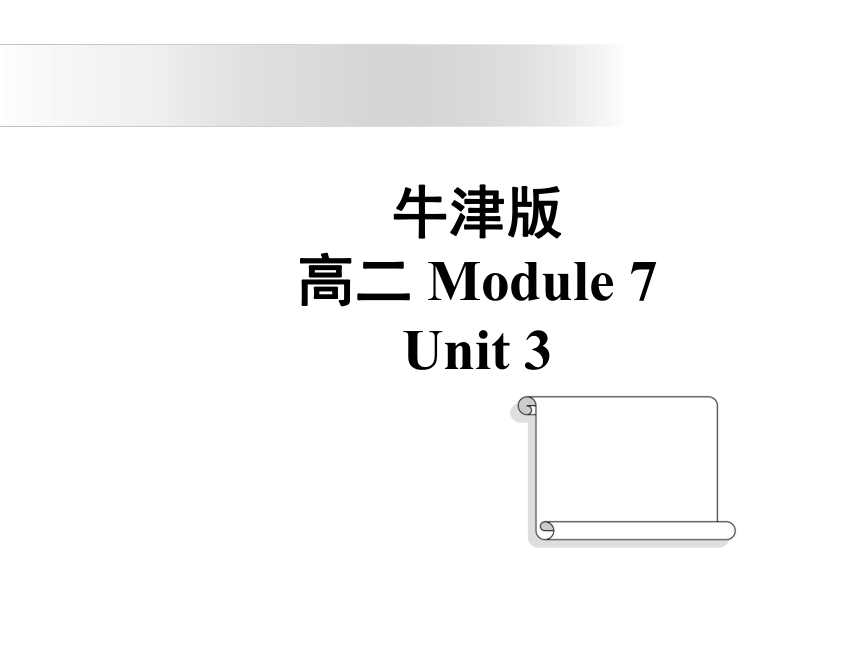 | |
| 格式 | zip | ||
| 文件大小 | 132.8KB | ||
| 资源类型 | 教案 | ||
| 版本资源 | 牛津译林版 | ||
| 科目 | 英语 | ||
| 更新时间 | 2019-06-12 08:34:27 | ||
图片预览

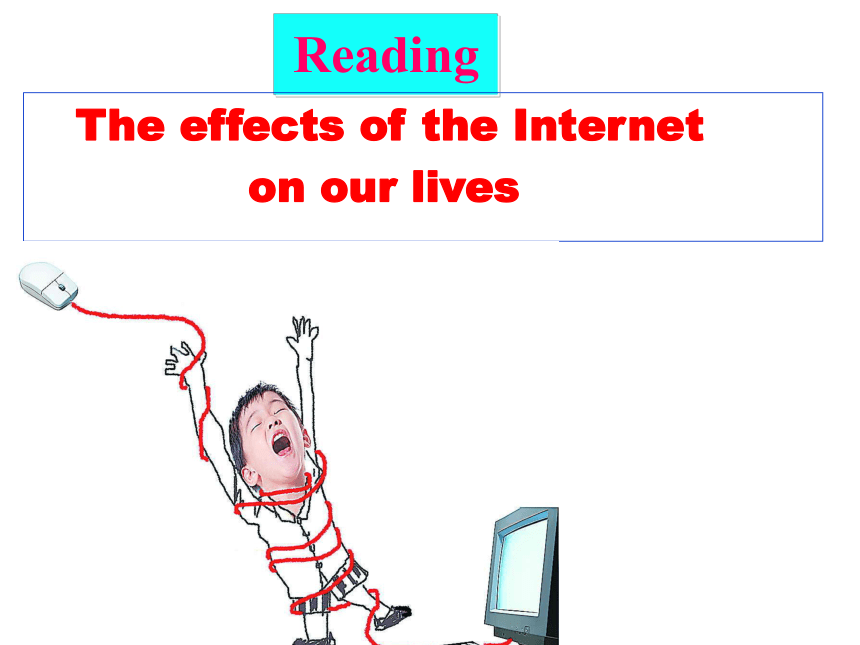
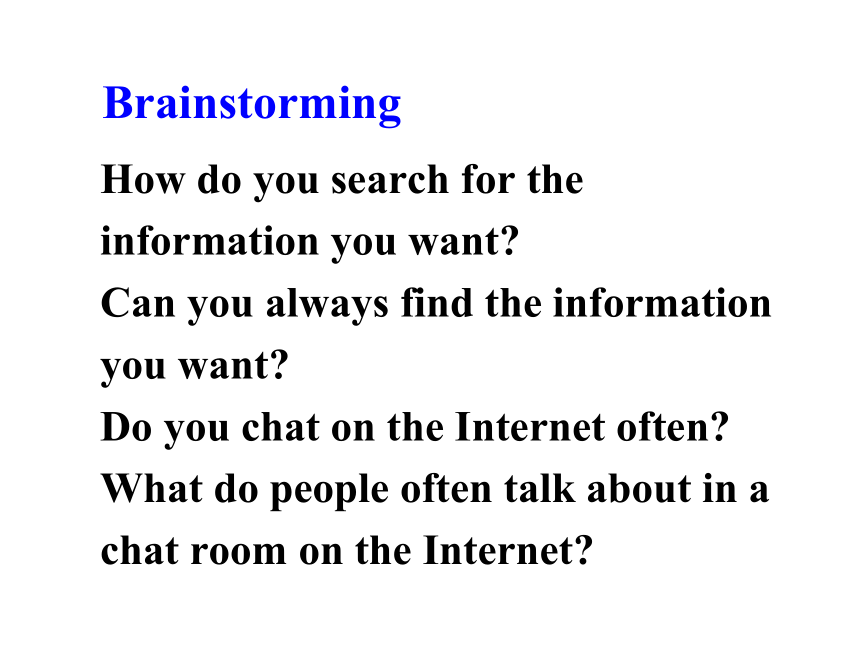
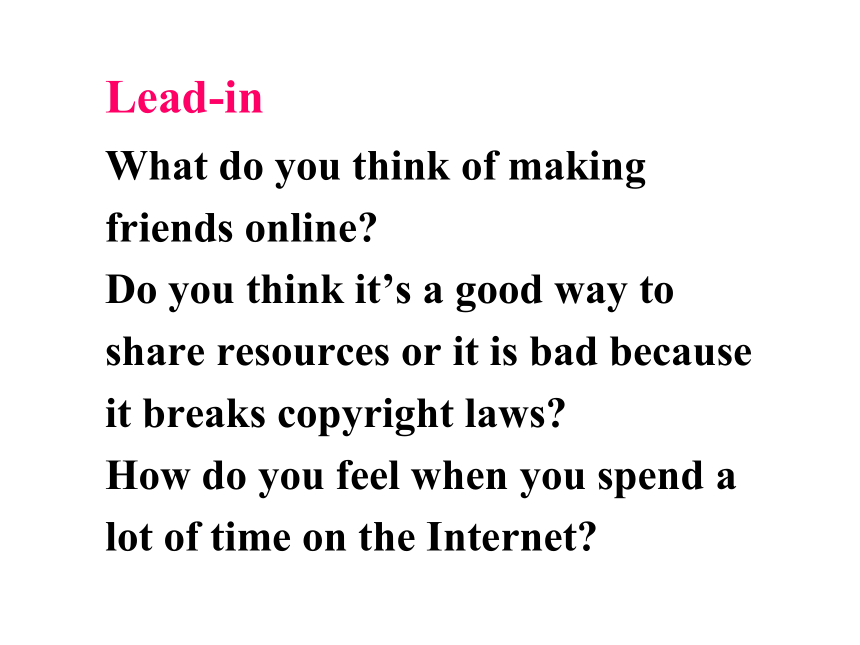
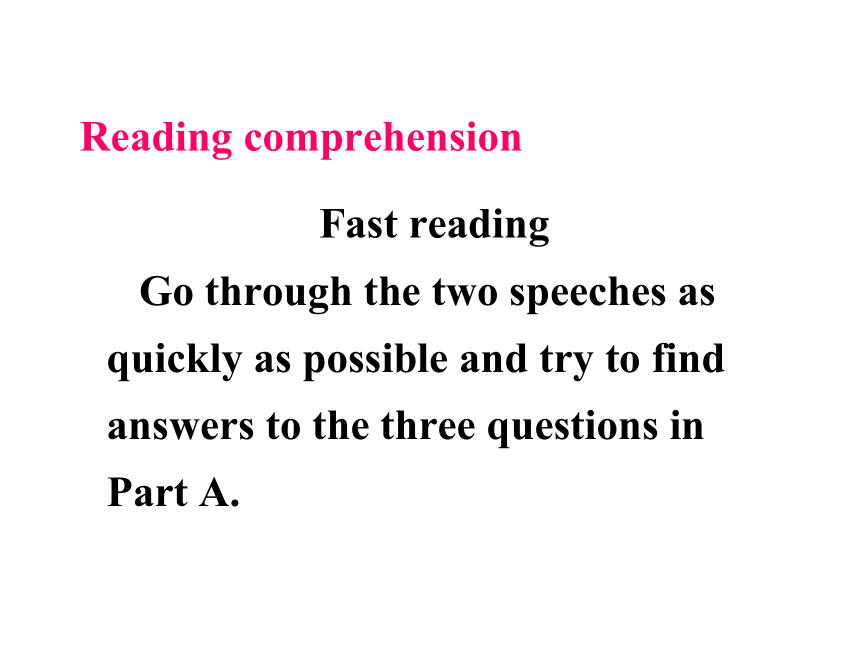

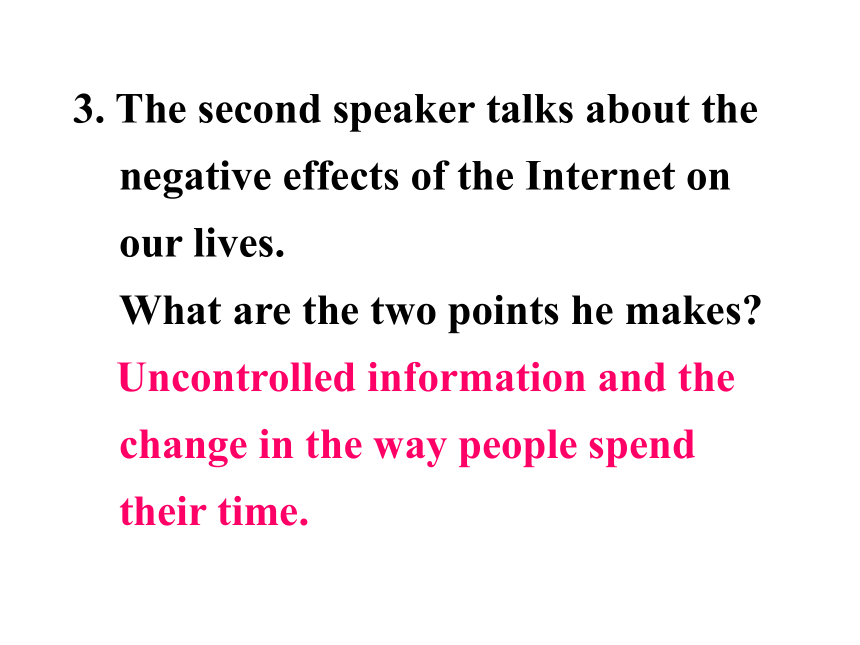


文档简介
课件23张PPT。牛津版
高二 Module 7
Unit 3Reading The effects of the Internet
on our livesBrainstormingHow do you search for the information you want?
Can you always find the information you want?
Do you chat on the Internet often?
What do people often talk about in a chat room on the Internet?Lead-inWhat do you think of making friends online?
Do you think it’s a good way to share resources or it is bad because it breaks copyright laws?
How do you feel when you spend a lot of time on the Internet?Reading comprehensionFast reading
Go through the two speeches as quickly as possible and try to find answers to the three questions in Part A.1. What are the speeches about?
They are about different effects of the Internet on our lives.
2. The first speaker talks about the positive effects of the Internet on our lives. How many main points does she make? What are they?
Two. Looking for information and building online communities and
form friendship on the Internet.3. The second speaker talks about the negative effects of the Internet on our lives. What are the two points he makes?
Uncontrolled information and the change in the way people spend their time.Detailed reading Read the following quotes from the speeches and write for for the arguments that support Internet use, or against for the arguments that do not support Internet use.People can write anything they want, and we cannot always tell if the information is true or corrent.
Of regular Internet users, 80 per cent mainly use the Internet to search for answers to questions.againstforSome experts say that spending too much building Internet relationships can damage people’s abilities to live normal lives.
People who are disabled and must stay in their homes can still communicate with the outside world and meet others with similar interests.againstforOne of the greatest benefits of Internet friendships is they are based on common interests, rather than appearance, age or popularity.
As the Internet has gained popularity, there has been an interesting change in the way people, particularly families, spend their time.againstforRead the facts below, and write down the argument each fact supports.The Internet is a great help to people who are in need of various information.People use the Internet to build social ties.The amount of false information on the Internet becomes more of a problem every day.Spending too much time building relationships
on the Internet can damage people’s abilities to live normal lives.Reading strategy: reading an argumentWhen you read an argument, you must remember that a specific view is being given.
The first thing you will read is a statement of what the argument is about. After that, you will usually find a list of the points or individual arguments.Another thing you will commonly find in an argument is a statement about what the other side believes, and why the debater does not agree.
At the end of the argument, you will find the conclusion. In the section, the main point of the argument is restated.Usage of reading strategy Read the passage again and point out which sentences are about the two speakers’ views, which sentences are the supporting facts the two speakers give, and which sentences are their conclusions.Exercises about new words in the passage1. abundant (Line 9)
2. assumption (Line 14)
3. avenue (Line 33)A. A belief that something is true or will happen
B. A possible way of doing something
C. groups of people with a common background or interest4. evaluate (Line 33)
5. accuracy (Line 34)
6. false (Line 39)
7. withdraw (Line 58)D. Not correct or true
E. form an opinion of the amount,value or quality of something
F. the state of being exact or correct
G. pull away fromSuggested answer of Part E(1) weaknesses (2) diverse (3) bonds
(4) addressed (5) click
(6) corresponded (7) statisticsPost- reading activitiesAsk students to role-play the debate.
Ask students to focus on part F.Homework1. Ask students to do Part A1 and A2 on Page 116 of the workbook.
2.Memorize the new words and phrases in the passage.
高二 Module 7
Unit 3Reading The effects of the Internet
on our livesBrainstormingHow do you search for the information you want?
Can you always find the information you want?
Do you chat on the Internet often?
What do people often talk about in a chat room on the Internet?Lead-inWhat do you think of making friends online?
Do you think it’s a good way to share resources or it is bad because it breaks copyright laws?
How do you feel when you spend a lot of time on the Internet?Reading comprehensionFast reading
Go through the two speeches as quickly as possible and try to find answers to the three questions in Part A.1. What are the speeches about?
They are about different effects of the Internet on our lives.
2. The first speaker talks about the positive effects of the Internet on our lives. How many main points does she make? What are they?
Two. Looking for information and building online communities and
form friendship on the Internet.3. The second speaker talks about the negative effects of the Internet on our lives. What are the two points he makes?
Uncontrolled information and the change in the way people spend their time.Detailed reading Read the following quotes from the speeches and write for for the arguments that support Internet use, or against for the arguments that do not support Internet use.People can write anything they want, and we cannot always tell if the information is true or corrent.
Of regular Internet users, 80 per cent mainly use the Internet to search for answers to questions.againstforSome experts say that spending too much building Internet relationships can damage people’s abilities to live normal lives.
People who are disabled and must stay in their homes can still communicate with the outside world and meet others with similar interests.againstforOne of the greatest benefits of Internet friendships is they are based on common interests, rather than appearance, age or popularity.
As the Internet has gained popularity, there has been an interesting change in the way people, particularly families, spend their time.againstforRead the facts below, and write down the argument each fact supports.The Internet is a great help to people who are in need of various information.People use the Internet to build social ties.The amount of false information on the Internet becomes more of a problem every day.Spending too much time building relationships
on the Internet can damage people’s abilities to live normal lives.Reading strategy: reading an argumentWhen you read an argument, you must remember that a specific view is being given.
The first thing you will read is a statement of what the argument is about. After that, you will usually find a list of the points or individual arguments.Another thing you will commonly find in an argument is a statement about what the other side believes, and why the debater does not agree.
At the end of the argument, you will find the conclusion. In the section, the main point of the argument is restated.Usage of reading strategy Read the passage again and point out which sentences are about the two speakers’ views, which sentences are the supporting facts the two speakers give, and which sentences are their conclusions.Exercises about new words in the passage1. abundant (Line 9)
2. assumption (Line 14)
3. avenue (Line 33)A. A belief that something is true or will happen
B. A possible way of doing something
C. groups of people with a common background or interest4. evaluate (Line 33)
5. accuracy (Line 34)
6. false (Line 39)
7. withdraw (Line 58)D. Not correct or true
E. form an opinion of the amount,value or quality of something
F. the state of being exact or correct
G. pull away fromSuggested answer of Part E(1) weaknesses (2) diverse (3) bonds
(4) addressed (5) click
(6) corresponded (7) statisticsPost- reading activitiesAsk students to role-play the debate.
Ask students to focus on part F.Homework1. Ask students to do Part A1 and A2 on Page 116 of the workbook.
2.Memorize the new words and phrases in the passage.
